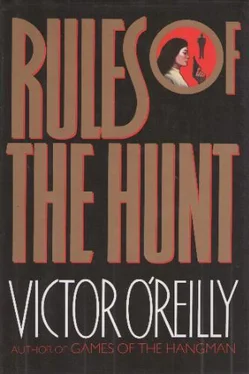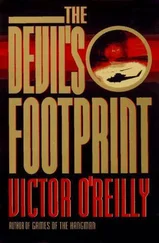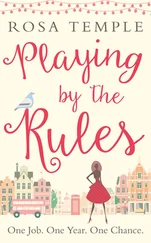Victor O'Reilly - Rules of The Hunt
Здесь есть возможность читать онлайн «Victor O'Reilly - Rules of The Hunt» весь текст электронной книги совершенно бесплатно (целиком полную версию без сокращений). В некоторых случаях можно слушать аудио, скачать через торрент в формате fb2 и присутствует краткое содержание. Жанр: Триллер, на английском языке. Описание произведения, (предисловие) а так же отзывы посетителей доступны на портале библиотеки ЛибКат.
- Название:Rules of The Hunt
- Автор:
- Жанр:
- Год:неизвестен
- ISBN:нет данных
- Рейтинг книги:4 / 5. Голосов: 1
-
Избранное:Добавить в избранное
- Отзывы:
-
Ваша оценка:
- 80
- 1
- 2
- 3
- 4
- 5
Rules of The Hunt: краткое содержание, описание и аннотация
Предлагаем к чтению аннотацию, описание, краткое содержание или предисловие (зависит от того, что написал сам автор книги «Rules of The Hunt»). Если вы не нашли необходимую информацию о книге — напишите в комментариях, мы постараемся отыскать её.
Rules of The Hunt — читать онлайн бесплатно полную книгу (весь текст) целиком
Ниже представлен текст книги, разбитый по страницам. Система сохранения места последней прочитанной страницы, позволяет с удобством читать онлайн бесплатно книгу «Rules of The Hunt», без необходимости каждый раз заново искать на чём Вы остановились. Поставьте закладку, и сможете в любой момент перейти на страницу, на которой закончили чтение.
Интервал:
Закладка:
" Sensei!" called Adachi.
A grizzled, lined face appeared at the top of the stairs. Sergeant Akamatsu looked as if he had either seen or experienced firsthand almost everything a Tokyo policeman could have over the last half century; and he had. He had joined the police force during the occupation, and had stayed on beyond retirement because he was an institution and could still do his job better than most rookies.
The sergeant's tie was loose and there was a glass of tea in one hand and a newspaper in the other. He had removed his gun belt, the top two buttons of his trousers were undone, and he was wearing slippers. His initial expression suggested that he was not overly pleased at having his well-earned break disturbed, but his face broke into a broad grin when he recognized Adachi.
"Adachi- kun," he said, the kun appendage indicating that the superintendent had been his pupil, "this is a pleasure. Come up and have some tea."
Adachi finished climbing the stairs, sat down on the tatami floor, and accepted the tea gratefully. He was silent at first, thinking. He had worked in this very koban a decade earlier under Sergeant Akamatsu, and every time he returned he got an acute attack of nostalgia for the place. It was curious, given the cramped utilitarian nature of the miniature construction – a typical police box was little more than a booth – but he had been privileged to learn under a real master. Whatever problems he encountered on the streets, he had always known that Akamatsu would know the answer and he had never been disappointed. He had very warm feelings toward the sergeant. Coming back from patrol to the streetwise presence of Sergeant Akamatsu had been as reassuring in its way as coming home. It was a fortunate man who worked under a great teacher.
When Adachi visited Akamatsu, they tended to reminisce and talk about general gossip rather than specific cases, because the superintendent's responsibilities were now at a level much higher than the sergeant's and neither wanted to draw attention to the differences of their worlds. It was more companionable to discuss matters in common. This was not a cast-iron rule, because from time to time Adachi felt the need to pick his old mentor's brains, but he had not so far raised the Hodama investigation. It was politically sensitive and operated mostly on a need-to-know basis.
The time had now come to consult Akamatsu. He put down his cup and they talked baseball for a few minutes, as Adachi searched for the right opening approach.
There was a natural break in the conversation, and then Sergeant Akamatsu spoke. "The Hodama business, Adachi- kun?"
Adachi smiled. "Ever the mind-reader, sensei."
Akamatsu laughed. "The entire force knows you're running the investigation, and the word is that it's going nowhere. Then you come to my koban with that certain familiar look on your face. I don't need to be a detective to work out where to go from there. So let's talk about it."
Adachi nodded and started to speak. Akamatsu filled his pipe and listened.
What you need is a little history," said the sergeant when Adachi had finished. "Files aren't enough and computers are dumb beasts. You need flesh and blood to get closer to what happened. Those were hard days after the war when the Namakas were building their empire."
"Can you help, sensei?" said Adachi.
"I think so," said Akamatsu. He was about to say more when shouts could be heard from the street below, and then almost immediately there was the sound of metal clashing and of people screaming in agony.
Both men rose to their feet, and as they did so, there was the sound of gunfire very close at hand. Then came shots immediately below.
Adachi drew his revolver and made for the stairs, with Sergeant Akamatsu buckling on his gun belt immediately behind.
The oyabun of the Insuji-gumi had learned from experience that too many attackers in a street hit could be counterproductive.
Armed with guns, hyped on the adrenaline rush, they had a tendency to shoot each other and a disturbing number of the passing citizenry. Equipped with swords and working close in, the only way you can with a blade less than three feet long, it became hard to tell who was hacking at who in the melee – and the victim had a fair chance of escaping amid a welter of spraying blood and wrongly targeted severed limbs.
Nonetheless, numbers definitely had an advantage if properly deployed. A would-be hero, a policeman or passerby, might go up against one assailant, but few sane people would go head-to-head with half a dozen sword-wielding assailants shouting battle cries.
The oyabun favored a human variation of a formation which fighter pilots, he had heard, called the ‘lazy deuce.’ Divided into pairs, the lead fighter would bore in for the kill, while the second aircraft, the wingman, stayed back and to the right and kept an eye out for any surprises – particularly from the rear.
With the ‘lazy deuce’ in mind, the oyabun sent one pair in front of Fitzduane and put the second pair behind, with himself and his kobun bringing up the rear. All were linked by radio, using concealed microphones and hearing-aid earpieces. They were wearing sunglasses and surgical gloves and were dressed in long, light-gray disposable polyethylene raincoats – the kind you buy in a packet in a department store when you get caught short – and floppy rain hats of the same material.
These shapeless outfits not only served as effective disguises but would also shield their wearers from blood. A hit with swords almost always resulted in a kill, but tended to be extremely messy. You could not very well escape unnoticed through the subway, as the oyabun intended, if saturated with gore. Tokyo was so crowded there was a convention that you behaved as if no one else existed, but there was a limit. Dripping crimson on your neighbor's shoes as you strap-hung side by side in a subway car would be regarded as decidedly ostentatious.
The designated hitter, a seasoned yakuza in his late thirties called Mikami, moved into position about ten paces behind the gaijin . When the oyabun gave the word, he would remove the sword concealed beneath his coat, rush forward, and strike. He would use a downward diagonal blow which would hit his victim on the right side of the neck and then penetrate deep into the torso, severing the spine and many of the major organs, and if delivered by an expert with the right-quality blade, would actually cut the body in two.
In this case, severance was unlikely. Mikami was an experienced swordsman, but the katana being used were not of the traditional quality; they were merely mass-produced, modern utilitarian reproductions. They were razor-sharp and deadly, but they did not have quite the same cutting power as the extraordinary works of art handmade by the master craftsmen of old. Even so, they would kill.
Since the body to which he was attached had been perforated twice, thus providing some serious motivation, Fitzduane had given a great deal of thought to the appropriate response to the threat. The safest solution was to stay isolated in protected surroundings. That was unpalatable. It was like being in prison. The next-best thing was to be reasonably unpredictable and to cultivate a high level of threat awareness. That was the option he had chosen, and he had the advantage of being naturally observant and intuitive. But he had also studied – and trained, trained, trained.
The objective was never – but never – to let your guard down, and always, even if thinking about something entirely different, to have your subconscious hard at work on looking out for the unusual, the different, that small something that hinted at danger. He had become very good at anticipating the unexpected.
Since it was a Sunday afternoon and raining, the pavement was not crowded and Fitzduane was able to walk as he had trained – with no one in an immediate threat area either in front of him or behind him. The concept of a defensible space is programmed into us by centuries of having had to fight for survival. In Fitzduane's case, his awareness of that invisible cordon around him was very high. If anyone came any closer, his senses were alerted. If that proximity was linked to any other unusual element, his senses screamed.
Читать дальшеИнтервал:
Закладка:
Похожие книги на «Rules of The Hunt»
Представляем Вашему вниманию похожие книги на «Rules of The Hunt» списком для выбора. Мы отобрали схожую по названию и смыслу литературу в надежде предоставить читателям больше вариантов отыскать новые, интересные, ещё непрочитанные произведения.
Обсуждение, отзывы о книге «Rules of The Hunt» и просто собственные мнения читателей. Оставьте ваши комментарии, напишите, что Вы думаете о произведении, его смысле или главных героях. Укажите что конкретно понравилось, а что нет, и почему Вы так считаете.




![Беар Гриллс - The Hunt [=The Devil's Sanctuary]](/books/428447/bear-grills-the-hunt-the-devil-s-sanctuary-thumb.webp)







